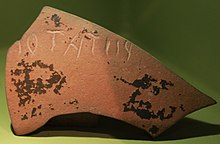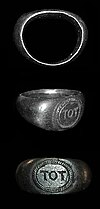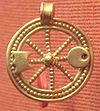Toutatis or Teutates is a Celtic god who was worshipped primarily in ancient Gaul and Britain. His name means "god of the tribe", and he has been widely interpreted as a tribal protector. According to Roman writer Lucan, the Gauls offered human sacrifices to him.
Name and nature
Toutatis (pronounced [towˈtaːtis] in Gaulish) and its variants Toutates, Teutates, Tūtatus, and Toutorīx, comes from the Gaulish Celtic root toutā, meaning 'tribe' or 'people' (compare Old Irish tuath and Welsh tud). A literal meaning would thus be "god of the tribe". A similar phrase is found in Irish mythology, which mentions the oath formula tongu do dia tongas mo thuath, roughly "I swear by the god by whom my tribe swears". Bernhard Maier proposes that his name derives from an older *teuto-tatis, with the meaning 'father of the tribe', although he notes that this etymology is uncertain.
It is believed Toutatis was a title for the tutelary gods of various tribes. Miranda Aldhouse-Green suggests that Toutatis was an epithet or description for Celtic tribal protector-gods, rather than a name. Paul-Marie Duval suggests that each tribe had its own Toutatis; he further considers the Gaulish Mars as the product of syncretism with the Celtic Toutatis, noting the great number of indigenous epithets under which Mars was worshipped.
Evidence

Inscriptions
Inscriptions dedicated to him have been found in Gaul (e.g. at Nîmes and Vaison-la-Romaine in France, and Mainz in Germany), in Britannia (e.g. at York, Old Carlisle, Castor, and Hertfordshire), in Noricum, and in Rome, among other places. Some of these inscriptions combine his name with other gods such as Mars, Cocidius, Apollo, and Mercurius.
Written evidence
Toutatis is one of three Celtic gods mentioned by the Roman writer Lucan in his epic poem De Bello Civili or Pharsalia. Written in the first century AD, it names Toutatis, Taranis, and Esus as three gods to whom the Gauls offered human sacrifices. In the 4th century commentary on Lucan, Commenta Bernensia, an author added that sacrifices to Toutatis were killed by drowning, and likened Toutatis to Mars or Mercury.
Those who keep watch beside the western shore, have moved their standards home;
— Lucan, Pharsalia, 1st century
The happy Gaul rejoices in their absence;
Now rest the Belgians, and the Arvernian race
Thou, too, oh Treves,
rejoicest that the war has left thy bounds.
Ligurian tribes, now shorn, in ancient days
first of the long-haired nations, on whose necks
once flowed the auburn locks in pride supreme;
And those who pacify with blood accursed,
savage Teutates, Hesus' horrid shrines,
and Taranis' altars, cruel as were those
loved by Diana, goddess of the north.
In his third-century work Divinae Institutiones, Roman writer Lactantius also names Toutatis as a Gaulish god to whom sacrifices were offered.
TOT finger rings

A large number of Romano-British finger rings inscribed with the name "TOT", thought to refer to Toutatis, have been found in eastern Britain, the vast majority in Lincolnshire, but some in Bedfordshire, Nottinghamshire, and Leicestershire. The distribution of these rings closely matches the territory of the Corieltauvi tribe. In 2005 a silver ring inscribed DEO TOTA ("to the god Toutatis") and FELIX ( happily") was discovered at Hockliffe, Bedfordshire. This inscription confirms that the TOT inscription does indeed refer to the god Toutatis.
In 2012 a silver ring inscribed "TOT" was found in the area where the Hallaton Treasure had been discovered twelve years earlier. Adam Daubney, an expert on this type of ring, suggests that Hallaton may have been a site of worship of the god Toutatis.
See also
References
- ^ Maier, Bernhard (1997). Dictionary of Celtic Religion and Culture. Boydell & Brewer. pp. 263–264. ISBN 9780851156606.
Teutates (later form: Toutates). Name of a Celtic god T. is mentioned by the Roman authors Lucan (Pharsalia 1,444-446) and Lactantius (Divinae Institutiones 1,21,3). According to Lucan the Gauls made human sacrifices to him. The Berne Scholia, commenting on Lucan, add that the victims were put head-first in a tub full of water and thus drowned...
- ^ Aldhouse-Green, Miranda (1986). The Gods of the Celts. Sutton Publishing. p. 110. ISBN 9780752468112.
What the Romans may have met in Celtic lands are tribal protector-gods with a war-role. In this connection Lucan's comment on Teutates, who was one of three Celtic gods said to have been encountered by Caesar's army in Gaul, may be relevant...
- ^ Cunliffe, Barry (2018) . "Chapter 11: Religious systems". The Ancient Celts (2nd ed.). Oxford University Press. p. 275. ISBN 978-0-19-875292-9.
Lucan, who, in Pharsalia, names three Celtic deities, Teutates, Taranis, and Esus. All were propitiated by human sacrifice: the victims of Teutates were to be drowned, those of Taranis burnt, and those sacrificed to Esus hanged. The Celtic names are informative. Teutates means 'the god of the tribe' from the Celtic teutā 'tribe'...
- Euskirchen, Marion (2006). "Teutates". Brill's New Pauly: Encyclopaedia of the Ancient World. Brill Publishers. doi:10.1163/1574-9347_bnp_e1205840.
Celtic god, who, along with Esus and Taranis (according to Lucanus 1,443-446), was allegedly worshipped by human sacrifice.
- ^ Koch, John (2006). Celtic Culture: A Historical Encyclopedia. ABC-CLIO. p. 1665.
Teutates (also Toutatis, Tūtuates, Tūtatus, Toutorix), Taranis, and Esus form Lucan's trinity of Gaulish gods (Pharsalia 1.444–6) to which Gauls near Massalia sacrificed their prisoners of war. The name Teutates occurs alone or as a secondary theonym in combination with Mars, Apollo (see Belenos), and Mercurius in texts and inscriptions, including sites now in Austria, England, France, Germany, and Italy...
- ^ Paul-Marie Duval (1993). Les dieux de la Gaule. Éditions Payot, Paris. ISBN 2-228-88621-1
- Lambert, Pierre-Yves (2002). La langue gauloise. Paris: Éditions Errance. ISBN 2877722244.
- Collingwood, R.Gh. and Wright, R.P. (1965) The Roman Inscriptions of Britain (RIB) Vol.I Inscriptions on Stone. Oxford. RIB 1017, online at romaninscriptionsofbritain.org
- Listing for Toutatis from www.arbre-celtique.com.
- "M. Annaeus Lucanus, Pharsalia, book 1, line 396".
- Spicer, Graham (16 July 2007). "Missing Link To Bloodthirsty Ancient Celtic Warrior God Uncovered". Retrieved 2012-08-07.
- "Record ID: BH-C3A8E7 - Roman finger ring". Portable Antiquities Scheme. 3 November 2007. Retrieved 2012-08-07.
- "Rare silver ring unearthed near site of Hallaton hoard". 7 August 2012. Archived from the original on 2012-08-11. Retrieved 2012-08-07.
Further reading
- Clémençon, Bernard; Ganne, Pierre M. "Toutatis chez les Arvernes: les graffiti à Totates du bourg routier antique de Beauclair (communes de Giat et de Voingt, Puy-de-Dôme)". In: Gallia, tome 66, fascicule 2, 2009. Archéologie de la France antique. pp. 153–169. ; www.persee.fr/doc/galia_0016-4119_2009_num_66_2_3369
- Lajoye, Patrice; Lemaître, Claude. "Une inscription votive à Toutatis découverte à Jort (Calvados, France)". In: Etudes Celtiques, vol. 40, 2014. pp. 21–28. ; www.persee.fr/doc/ecelt_0373-1928_2014_num_40_1_2423
- M. Almagro‐Gorbea, A. J. Lorrio Alvarado, Teutates: el héroe fundador, Madrid, Real Academia de la Historia, 2011
External links
| Celtic mythology series | ||
|---|---|---|
| Ancient deities of Gaul, Britain and Gallaecia by region | ||
| Supra-regional |
|   |
| Britannia | ||
| Gallia Aquitania | ||
| Gallia Belgica | ||
| Gallia Celtica | ||
| Gallia Cisalpina | ||
| Gallia Narbonensis | ||
| Germania Inferior | ||
| Gallaecia | ||